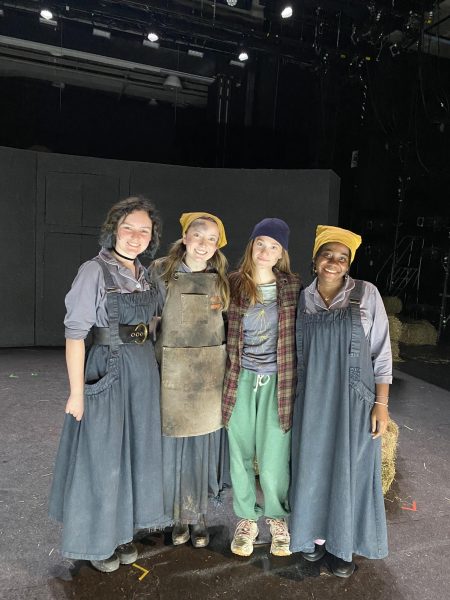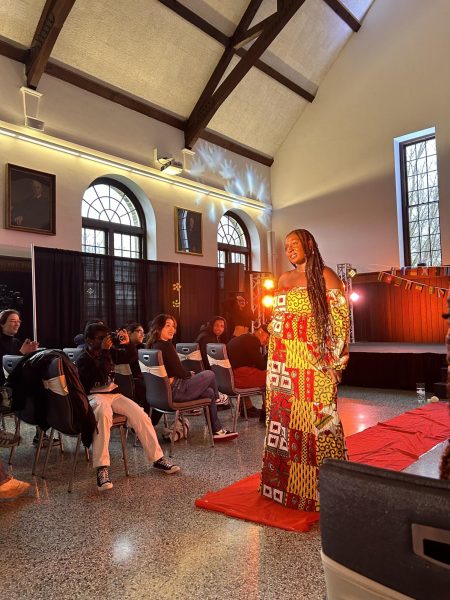Kirsten Johnson’s Film Dick Johnson is Dead Grapples With Progressive Dementia
Kirsten Johnson’s Dick Johnson is Dead melds observation, experience and imagination as she attempts to preserve her father’s memory through comedy. Documenting the stages of progressive dementia, the film is made up of unexpected staged deaths, imagined heaven and hellscapes and a mixture of heartwarming and heart wrenching moments from everyday life – all while devotedly representing the personality and essence of Dick Johnson.
On Feb. 19, filmmaker Kirsten Johnson came to Colgate as part of the Friday Night Film Series to virtually answer questions about the docu-comedy, during which she revealed invaluable insights into her experience with the project.
“It is wrenching for me that my father has dementia. Filming is the only thing I can do. We did do some things; we played with time and we reconstructed and rebuilt him in some ways out of cinema. He appears to be less far in his dementia in the beginning of the movie than he was, and we did that with the tools of cinema,” Johnson said.
Johnson expresses her awe at the ability of the documentary form to gradually build itself out of seemingly random moments and forge magical connections within itself. From the start, Johnson was aware that this project was risky, not only because it was towing an ethical line, but also because it would be unpredictable every step of the way.
Countless clips were imbued with raw emotion that could not have been predicted nor scripted. In a moment of heavy sadness, Johnson laid her camera down sideways on the carpet to hug her father; the rest of the scene is captured from this candid angle. When she was caught off guard by one of Dick’s strange and insightful musings, she let the camera slip out of focus while he spoke. These hiccups in precise camerawork did not disrupt the flow of the final product but rather added to the evocative pull in tender scenes between Dick and Kirsten.
“If this film were to be made by someone other than Kirsten Johnson, I don’t think it would have the same effect. The film overall presents an unbreakable bond between a father and a daughter as well as their shared experience with his progression of dementia. Her role as both a daughter and filmmaker is interesting, as there were obvious moments in the film where being a daughter had to come first. Those moments were really touching and really added to the emotion that the film evokes in the spectator,” senior Emily Stankiewicz said.
Furthermore, the staged moments were just as unpredictable as the real moments. During a staged death that required fake blood squirting out of Dick’s neck, he suddenly became upset and argued that this pain was worse than that of his heart attack because he was cold and wet. After the scene came to an abrupt halt, however, Johnson recounts how her father said it was actually fun and happily inquired what was next. In a previous interview, Johnson described this challenge as co-directing with dementia.
There were also coincidences in the small details of the mise-en-scène that further proved the magic of documentary-making. Throughout the film, Dick’s unique feet come up as a source of his shame as well as a part of him that made him who he is today. Johnson shared that when the family of Dick’s friend, Lolita, sent in a picture of their father to use in the film, it happened to be a picture of him with his bare feet up in his office chair – the same way that they often show Dick himself throughout the film – although the family had no idea about the role Dick’s distinctive feet played in his life and the film.
“There are many scenes in which we see Dick eating a chocolate fudge cake or chocolate ice cream or taking a midday nap or just enjoying those bodily pursuits that we all enjoy. At the same time, he seemed to be tortured by his feet – the idea that his feet are ugly or abnormal or need to be fixed in some way. I wonder if that was a conscious decision to create those tensions between the pain and pleasure that his body can give him,” Assistant Professor of Film and Media Studies Neta Alexander said.
All of these small intricacies of the film – and Dick himself – ultimately amalgamate to form this wonderfully complex tribute to Johnson before his death. The staged funeral at the end of the film (which Dick attends) has taken on a new significance during the pandemic since many people have been denied a proper funeral or celebration of their lives. Considering our heightened awareness of the sometimes suddenness of death, Kirsten Johnson wonders whether more people will follow in her footsteps to help family members become involved in chronicling and preserving their lives in their own ways.
Johnson closed the discussion by suggesting that people fill the sentence “___ is dead” with the person that they would least like to hear in that place. Then, they attend to this fear by trying to preserve their presence: recording their voice or drawing them a picture, for example. Johnson suggests that if that person is already gone, one should find somebody who knew them and ask to hear more about them in order to reanimate their memory, as Dick Johnson is Dead seeks to do.










